Bedtime Story

Brief Synopsis
Cast & Crew
Alexander Hall
Fredric March
Loretta Young
Robert Benchley
Allyn Joslyn
Eve Arden
Film Details
Technical Specs

Synopsis
After seven years of marriage, actress Jane Drake is anxious to leave the stage and retire to a farm in bucolic Connecticut while her husband, producer-playwright Lucius "Luke" Drake is roaring to start rehearsals for his new play. When Luke informs Jane that he has sold their dream farm and invested the proceeds in a theater, she packs her suitcase and travels to Reno for a divorce. To win Jane's sympathy, Luke plants an item in a gossip column, announcing that he has abandoned all plans for his play. Luke's ploy works and Janes flies back to New York, but when she finds the manuscript for the new play hidden in Luke's desk drawer, she returns to Reno. Luke follows Jane to Reno and arrives at her hotel just as she greets her dinner date, conservative banker William Dudley. When Luke asks for a chance to talk to Jane alone, Dudley offers him the keys to his car, and the estranged couple goes for a drive. After the car runs out of gas, they cross the state line in search of a gas station. Discovering that the pumps are locked and the owner will not return with the key until morning, the pair are forced to spend the night in a motor court. As a favor to Luke, Jane agrees to read his new play, and although she finds herself fascinated by the drama, she still refuses to appear as his leading lady. The next morning, Luke discovers that he has no money and so Jane pays their hotel bill and they head back to Reno. After her divorce is granted, Jane returns to New York and reads that Luke has cast comedian Virginia Cole as his leading lady. Unknown to Jane, Virginia's miscasting is a ploy by Luke to force her to reconsider the part. After Jane tells Luke that she has moved into a furnished apartment, Luke decides to auction all the furniture they had painstakingly collected during their seven years of marriage, and Jane becomes upset when all her prized possessions are purchased by a strange little man named Dinglehoff. When Luke reads that Jane has become engaged to Dudley, he schemes to win her back. Learning that the police plan to raid a club named Billy's that night, Luke suggests to Jane that she and Dudley join him for dinner and offers to invite Dudley himself. Instructing Jane to meet him at the theater, Luke then phones Dudley and directs him to meet them at Billy's. When Jane arrives at the theater in the middle of rehearsals, Luke pretends to chastise Virginia's performance and Jane offers to coach her. Ascending the stage, Jane gives such a powerful reading that Virginia feigns intimidation and quits. When Luke laments that without a leading lady, he must cancel the production, Jane offers to take the part on a temporary basis. As they leave the theater, a policeman mentions that Dudley has been arrested and Jane, realizing that the entire evening has been an elaborate ruse to win her back, reneges on her promise, bails Dudley out of jail and elopes with him. Upon learning about Jane's marriage, Luke instructs his manager, Eddie Turner, to hire two unknown character actors. That night, as Jane packs to go on a business trip with her new husband, Luke's actors, posing as representatives from the Drakes's insurance company, ring her doorbell. After they question the validity of Jane's Reno divorce and hint at bigamy, Dudley gets nervous and sends for his lawyer. When Luke arrives at the apartment, Dudley, his lawyer and the insurance men closet themselves in a room. After the lawyer asks for proof of Jane's required six-week residence in Reno, she sifts through a pile of papers and hands him her hotel bills. Among the papers, Jane finds a receipt from her stay in California with Luke and realizes that it could jeopardize her divorce. Upset, Jane accuses Luke of being selfish, and in response, he confesses to hiring two actors to pose as insurance investigators and then leaves. Soon after, Emma Harper, a member of the theater company, appears at Jane's apartment with news that Luke has canceled the play because of his love for Jane. Realizing that she still loves Luke, Jane hands Emma the hotel receipt and asks her to deliver it to him with instructions to pay her back. When Emma presents him with the receipt, however, Luke is so drunk that he tears it up without reading it. Later, while playing with the pieces, Luke recognizes the receipt, and realizing its significance, hurries to Jane and Dudley's hotel. When the desk clerk refuses to divulge their room number, Luke tricks the cashier into revealing it and then, pretending to be Dudley, summons room service, the hotel plumber, maid and electrician to his room. Confounded by the sudden influx of humanity, Dudley complains to the hotel manager, who dispatches a team of bellboys to disperse the "riot." Amid the ensuing brawl, Luke arrives to rescue Jane and escorts her to their old apartment, which has been re-furnished with all their cherished belongings. When Luke admits to having bought all their furniture and offers to re-purchase the farm, Jane confesses that she already owns it and asks to see a copy of his play so that she can start work. The play is a hit, and during the opening night curtain, Jane announces that the production will have a short run because she is pregnant.

Director

Alexander Hall
Cast

Fredric March

Loretta Young

Robert Benchley
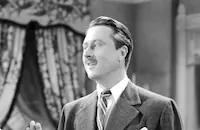
Allyn Joslyn
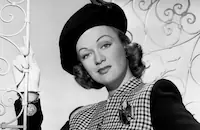
Eve Arden

Helen Westley
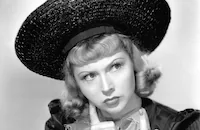
Joyce Compton
Tim Ryan
Olaf Hytten
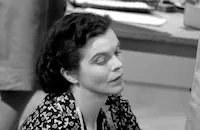
Dorothy Adams
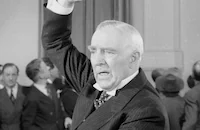
Clarence Kolb
Andrew Tombes
Stanley Brown
Beatrice Maude
Jayne Hazard

Emmett Vogan
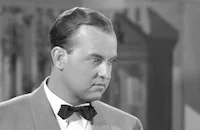
Grady Sutton

Edward Mcwade
Curtis Railing
Alice Keating

Pierre Watkin

Louise Currie
John Tyrrell
Jack O'malley
Torben Meyer
David Oliver

Byron Foulger
Chester Clute
Georgia Backus
Claire Rochelle
Ted Oliver
Duke York
Ed Fetherston
Marshall Ruth
Vernon Dent
James C. Morton
Philo Mccullough
William Ruhl
John Frank
Don Barclay
Kathryn Sheldon
Sarah Edwards
Ernie Adams
Harry Strang
Sammy Blum
Harry Depp

James Flavin
Reginald Sheffield
Spencer Charters
Cecil Weston
Bessie Wade
Dorothy Vernon
Jane Keckley
Catherine Courtney
Jessie Arnold
Crew
Lionel Banks
George Cooper
Richard Flournoy
Grant Garrett
Werner R. Heymann
Horace Jackson
Viola Lawrence
William Mull
Cary Odell
B. P. Schulberg
George Seaton
M. W. Stoloff
Joseph Walker

Videos
Movie Clip


Film Details
Technical Specs

Articles
Bedtime Story (1941)
When Bedtime Story opened at Radio City Music Hall, it suffered in the New York press from comparisons to its immediate predecessor at the theater, the Spencer Tracy-Katharine Hepburn comedy Woman of the Year (1942). Bosley Crowther, writing in the New York Times, called Young's character "another headstrong dame." But he went on to complain that "This time the lady is neither original nor is she Katharine Hepburn; she is just Loretta Young, flouncing and posing airily..."
Young, who had recently left 20th Century Fox after a dispute with studio head Darryl F. Zanuck, had begun free-lancing and was pleased to have been offered a series of roles at Columbia even though her salary there ($75,000) was half of what she had enjoyed at Fox. However, she was soon at loggerheads with Columbia boss Harry Cohn. Matters came to a head during the filming of Bedtime Story when Young offered to shop for a dress to wear in one scene because the designer Irene had run short of time in designing her costumes.
Young paid $100 for the dress, but the studio was charged $700 -- a price that included alterations and changes in design by Irene. According to Young biographers Joe Morella and Edward Z. Epstein, a furious Cohn refused to listen to Young's explanation and told her, "Nobody's gonna cheat me and get away with it. I'm taking away your top billing, and you're not gonna wear that dress in the picture either. You'll wear what I tell you to wear!" In retaliation, Young was deliberately late for fittings for the replacement costume, so that the wardrobe staff had to be paid overtime.
Cohn did give Fredric March top billing in print ads for the film. Although Young was contracted for one more film at Columbia, the executive and the actress were no longer on speaking terms. The studio did, however, launch an extensive advertising campaign for Bedtime Story that included Young's image in ads for Lux Soap. She repeated her role from the film on Lux Radio Theatre with Don Ameche in March's role.
Producer: B.P. Schulberg
Director: Alexander Hall
Screenplay: Richard Flournoy, from story by Horace Jackson and Grant Garrett
Cinematography: Joseph Walker
Art Direction: Lionel Banks
Original Music: Werner R. Heymann
Editing: Viola Lawrence
Costume Design: Irene (uncredited)
Cast: Fredric March (Lucius "Luke" Drake), Loretta Young (Jane Drake), Robert Benchley (Eddie Turner), Allyn Joslyn (William Dudley), Eve Arden (Virginia Cole), Helen Westley (Emma Harper), Joyce Compton (Beulah).
BW-85m.
by Roger Fristoe

Bedtime Story (1941)
Quotes
It's a smash hit, Eddie -- it'll run five years!- Luke Drake
Ladies and gentlemen! This will have the shortest run of any of Mr. Drake's plays...- Jane Drake
No, no, no. Five years!- Luke Drake
It will be closed in the early spring by an act of God. And I'm sure Mr. Drake hopes it will be... a boy.- Jane Drake
Trivia
Notes
According to news items in Hollywood Reporter, casting problems delayed the start of production on this film for several months. Joan Bennett, Rosalind Russell and Carole Lombard were considered for the female lead, while Cary Grant, Lloyd Nolan and Henry Fonda were discussed for the male lead. Although a pre-production news item in Hollywood Reporter noted that Sidney Buchman was to collaborate on the script with Richard Flournoy, the extent of Buchman's contribution to the released film has not been determined. Although SAB claims that this film was based on a play by Horace Jackson and Grant Garrett, the program notes state that the picture was based on an original story by Jackson and Garrett. A news item in Hollywood Reporter added that the theater scenes were filmed at the Belasco Theater in downtown Los Angeles. Loretta Young reprised her role in a Lux Radio Theatre broadcast on June 22, 1942, co-starring Don Ameche. The story was broadcast again on February 26, 1945 and also on the Lux Video Theatre on November 10, 1955.














